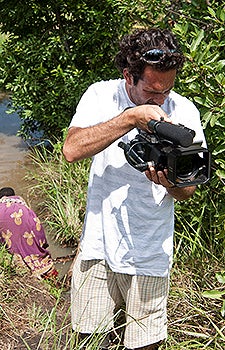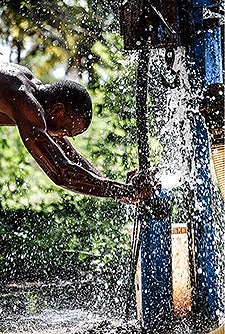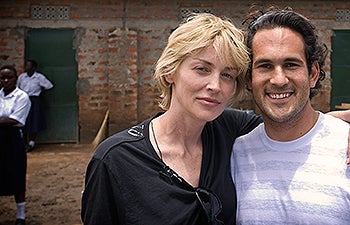My Name Is Water
Justin Arana was traveling the world on a spiritual quest to find himself. The journey was spurred by his grandfather, who had asked if Arana would be happy with the worth of his life if he died the next day.
It was 2008, three years after Arana had earned his bachelor’s degree in international relations at USC Dornsife.
While visiting the surfing village of Morrungulo, Mozambique, on the southwest coast of Africa, he took a walk that steered the course of his travels — and life.
It was a long walk. He was accompanying a local family to collect drinking water. After an hour and a half, the group arrived with their containers. Arana immediately noticed the dirty, shallow pools of water. Nearby, cows had defecated. This was the family’s water source.
“The experience was a stark eye-opener,” Arana said. “I was really confronted with the lack of access to clean water.”

Justin Arana films women in Mozambique on their journey to retrieve water. The woman and her daughter walked for more than an hour to the water source surrounding by animals grazing and defecating.
All the while, Arana was filming his experiences to share with friends and family back home in Los Angeles. That footage would evolve into Arana’s debut documentary, My Name Is Water. Produced by actress Sharon Stone, the movie premieres Oct. 16 at the Hollywood Film Festival in L.A. The documentary chronicles Arana’s efforts to bring clean water to Morrungulo and Mozambique.
Back in Morrungulo, a day after witnessing the water conditions, Arana passed by the local hospital. Long lines of women and children waited patiently to be examined. He asked one of the nurses what everyone was being treated for.
“She said most all of the patients had water-borne diseases,” Arana said. “There were a handful of cases of AIDS and malaria, but that cholera and other diseases were the most prevalent. They couldn’t keep any supply of medicine in the hospital because people just keep coming in with ailments from unclean water.”
At that point in his life, Arana was already an experienced traveler. During his senior year in college, he had volunteered as a medical aid worker in the Darfur region of Sudan during the height of the genocide. Following that, he worked with divestment campaigns related to the ongoing genocide. Now, it appeared he had another opportunity to make a difference.
That evening, he sent an email to his former colleagues from his work with Darfur initiatives. He described the situation in Mozambique and posed a solution: the village needed a water well. He would oversee the installation and management if funds could be provided.

Sebas Ngomane of Morrungulo tests out the village’s new well. A compressor is inserted into the well’s casing to flush out the water and create access to clean water.
For about $6,000, infrastructure could be built so that Morrungulo residents could tap into fresh water in aquifers below ground, he said. Children who previously stayed home from school to help their mothers collect water on twice daily, three-hour round-trip journeys could be back in class learning. Diseases could be prevented.
“Water is a human necessity,” Arana said. “If you’re getting unclean water, it affects every single part of life.”
The next morning, Arana received an email. A donor came through with the funds.
As a result of the new well, which was placed in the local school so that all families could easily access it, attendance at the school doubled. Arana set up an oversight committee to ensure that water would be equally distributed and the well would be maintained.
“There’s a shocking statistic of how many wells end up failing in sub-Saharan Africa because of a lack of maintenance,” Arana said. “So many things can go wrong, from a gasket breaking or pipes corroding. We didn’t want to put a well in and then have it break down and be no good to anybody.”
Involving the community in the well’s upkeep also established self-reliance and dignity in the community, Arana noted. Six years later, the well in Morrungulo continues to thrive.
“These are all lessons that I had learned during my time at USC,” Arana said. He credits his international relations courses in “International Organizations” and the “Politics of Global Environment” with building a solid foundation for his work in Mozambique.

Sharon Stone and Justin Arana in Northern Uganda. Stone produced Arana’s documentary, My Name Is Water. Photo courtesy of Justin Arana.
His efforts and expertise were noticed by actress Sharon Stone, whose philanthropy is related to AIDS research in developing countries. Since 1995, Stone has worked with the AIDS research organization amfAR. The group had made strides in helping HIV-positive women deliver healthy babies. In many countries, mothers cannot nurse their babies without transmitting the infection. They must use formula, which is often mixed with unclean water. Stone wanted to educate herself about preventing water-borne illnesses in these babies.
Arana was asked to accompany Stone on a tour of cities in Northern Uganda and South Africa to learn more about the issue. During the trip, Stone learned about Arana’s work in Mozambique and encouraged him to turn his footage into a documentary. The result became My Name Is Water.
Arana hopes the film will inspire others to take action to seek positive change.
“We have the power to make a difference,” Arana said. “It’s not something that’s dependent on major organizations. We have the capacity to touch people’s lives in a very powerful way. Water is a wonderful example of that. When you bring clean water to a community, you see results right away.”
Although Arana’s grandfather died before seeing his grandson’s contributions, Arana is at peace knowing the answer he would give his grandfather now would be, “Yes.”
Arana is continuing to bring wells with clean water to other communities in Mozambique and other parts of Africa with the nonprofit he founded, Water Underground.
The world premiere screening of My Name Is Water takes place tonight at the Hollywood Film Festival at the Hollywood Arclight Cinema. It will be followed by a Q&A with Arana and Stone. For more information about the film visit MyNameIsWater.com.